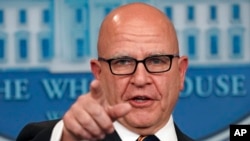An already tense relationship between the United States and Turkey appears to be under more strain after a top Trump administration official accused Turkey of spreading what he called extreme Islamist ideology around the world.
President Donald Trump's national security adviser, General H.R. McMaster, said Tuesday that Turkey had joined Qatar as a prime source of funding that contributes to the spread of extremist ideology.
"We're seeing great involvement by Turkey from everywhere from western Africa to Southeast Asia," McMaster said during an appearance in Washington. "The Balkans is an area of grave concern now."
Not funding terrorists themselves
McMaster stopped short of accusing Ankara of funding actual terrorist groups. Instead, he voiced concern that Turkey was following in the footsteps of Saudi Arabia in the 1970s, and more recently Qatar, by funding groups that help create the conditions that allow terrorism to flourish.
"We didn't pay enough attention to how extremist ideologies were being advanced through madrassas and mosques, and so-called charities more broadly," he said.
Turkey's Foreign Ministry criticized McMaster's remarks Wednesday, calling them "astonishing, baseless and unacceptable."
"We expect the United States, which we continue to recognize as our friend and ally, to display the same stance to our country, to cease all forms of cooperation with terrorist groups such as YPG and provide more concrete and effective support in our ongoing determined fight against terrorism and radicalism," the ministry said in a statement.
Support for YPG
U.S. and Turkish relations have eroded in part because of Washington's support for the YPG, a Kurdish militia that has helped fight the Islamic State terror group in Syria. Ankara says the YPG is linked to the Kurdistan Workers' Party, or PKK, which is waging a Kurdish insurgency inside Turkey. Ankara, along with the European Union and United States, has designated the PKK as a terrorist organization.
Relations between Washington and Ankara also soured following a failed July 2016 coup in Turkey. Ankara accuses Muslim cleric Fethullah Gulen of involvement in the coup attempt. Gulen, who lives in self-imposed exile Pennsylvania, denies the accusation. The U.S. has refused calls for his extradition.
More recently, Trump's decision to officially recognize Jerusalem as Israel's capital has upset Turkey, with Turkish President Recep Tayyip Erdogan saying, "This could go so far as cutting our diplomatic relations with Israel. You cannot take such a step."
Russia, Iran
In the meantime, recent Turkish overtures toward Russia and Iran have not gone over well with officials in Washington, who also worry Turkey will serve as a model for Islamist groups hoping to seize power.
McMaster said Tuesday, "A lot of Islamist groups have learned from" Erdogan and his Justice and Development Party (AKP).
It is a "model of really operating through civil society," McMaster said, "then the education sector, then the police and judiciary, and then the military to consolidate power in the hands of a particular party, which is something we'd prefer not to see and is sadly contributing to the drift of Turkey away from the West."
VOA's Turkish service contributed to this report.












